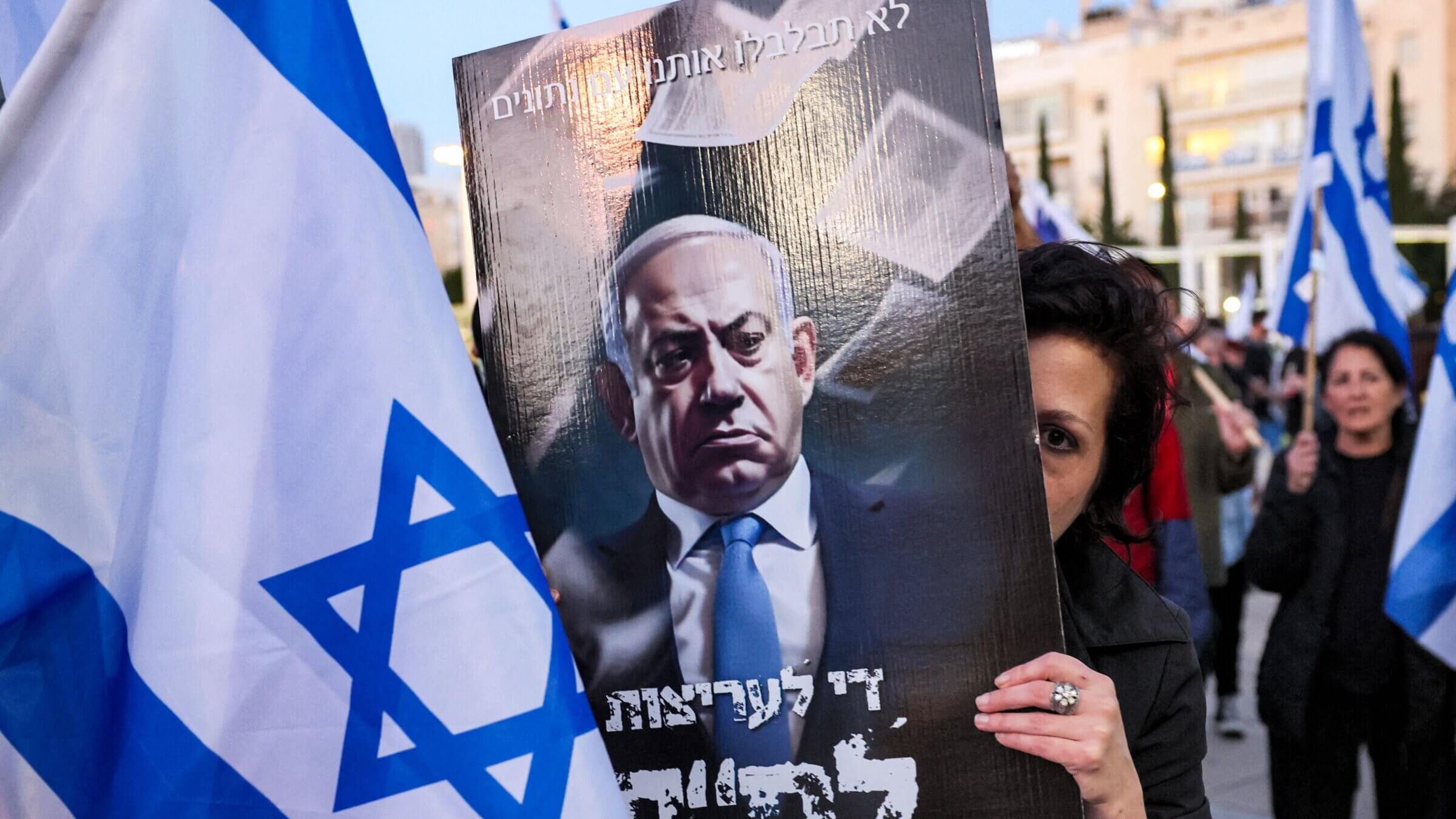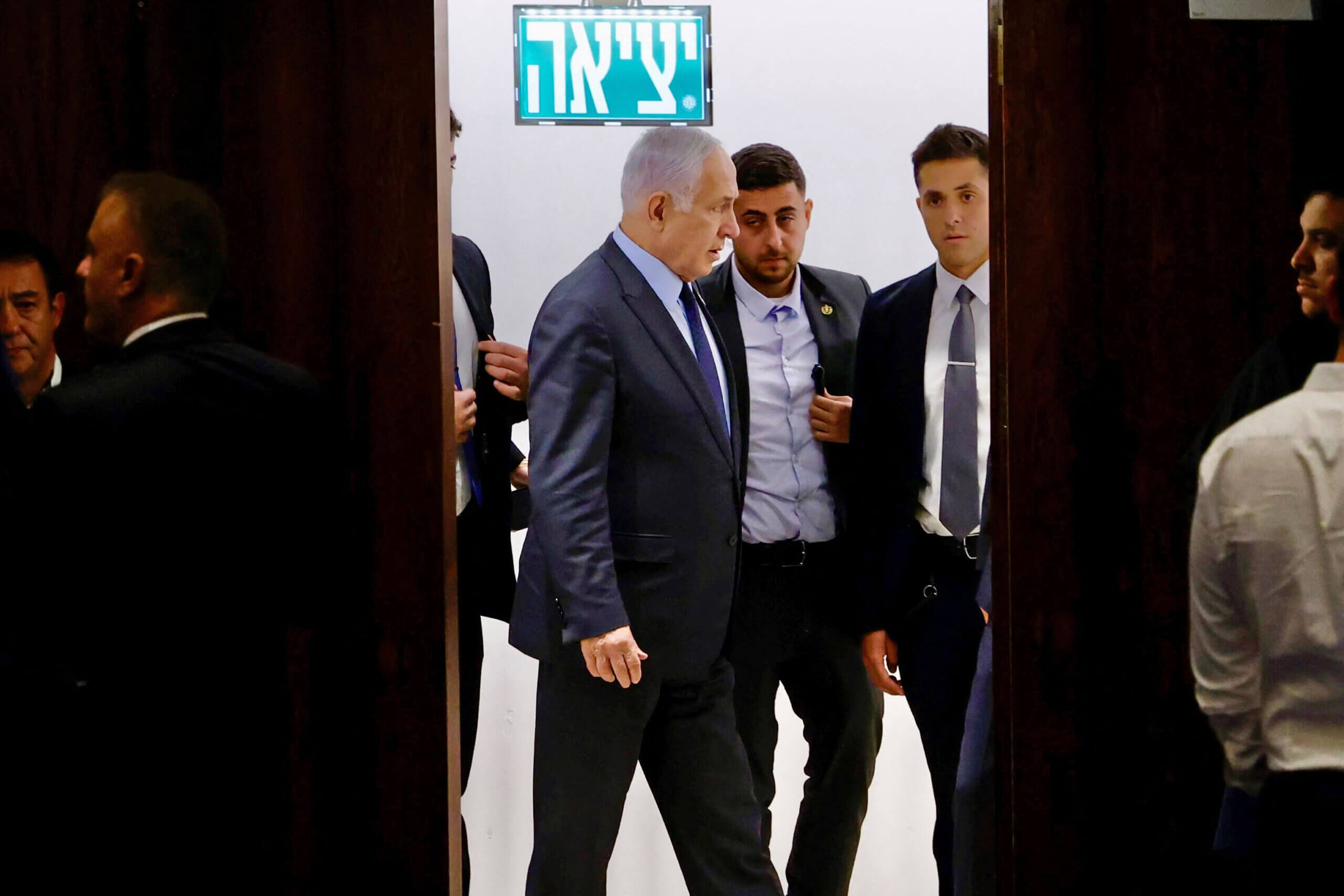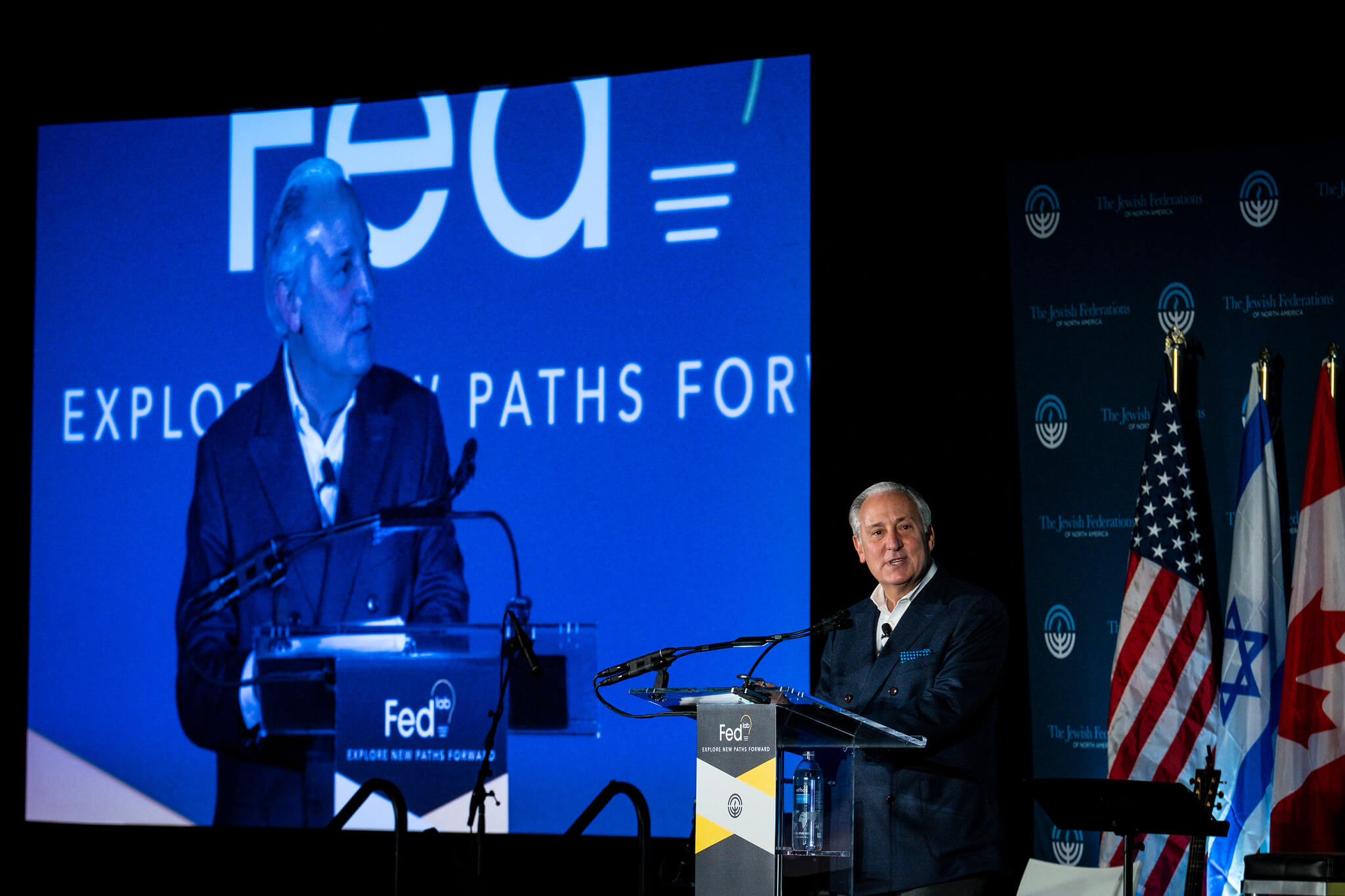Conference meant to celebrate Israel’s 75th may be overwhelmed by protests
The Jewish Federations of North America’s annual conference in Israel comes as many top Jewish leaders and philanthropists have been unusually critical of the Israeli government

Israeli anti-government protesters are angry over the Jewish Federation of North America’s decision to host Prime Minister Benjamin Netanyahu at their annual conference’s opening Sunday night in Tel Aviv. Many plan to demonstrate outside the convention center, while others may disrupt Netanyahu’s remarks inside. Photo by Getty Images
When the Jewish Federations of North America decided to host its annual conference in Israel this year, organizers moved it from fall to spring to overlap with the country’s milestone 75th anniversary next week.
But the event, a premier meeting of establishment American Jewish leaders, will now also unfold amid the massive anti-government protests that have rocked Israel in recent months — and itself is being targeted by that movement.
Israeli protest leaders are planning to greet the conference’s 3,000 attendees as they arrive at their Tel Aviv hotels on Sunday and lead a march to the convention center, where Israeli Prime Minister Benjamin Netanyahu is scheduled to address the conclave that night. Inside, some attendees plan to disrupt Netanyahu’s speech.
The event comes at an unusual moment when top Jewish leaders and philanthropists who are normally loath to openly criticize Israel have come out swinging against the Israeli government, with American Jewish business leaders threatening to pull investment from the country and some donors even boycotting local federations.
“For the last couple weeks I’ve gotten calls saying, ‘I don’t want to give to federation because you’re supporting Israel,’” said Lonnie Nasatir, president of the Jewish United Fund, the Chicago federation.
Israeli expatriates in the U.S. sent a letter last week calling on federation leaders to cancel the speech by Netanyahu and an appearance by a Knesset member behind the government’s proposed judicial overhaul.
In response to the letter, the federations network — which had led an unusual emergency mission to Israel in March to call for a compromise — issued a statement about the importance of hearing from Israel’s elected leaders. “We look forward to welcoming these officials on this historic occasion,” the statement said.
Offir Gutelzon, a leader of UnXeptable, the Israeli expatriate group that organized last week’s letter, said he hoped that protests in Israel would convince federation leaders to take a stronger stand against the judicial reform legislation, which has been paused until May.
“They’ll see when they land in Israel who their real allies are,” he said of the American leaders. “Those allies are in the protest movement.”

The conference, known as the General Assembly, lasts through Tuesday. The official program includes relatively little discussion of the proposed changes to Israel’s Supreme Court that have drawn hundreds of thousands of Israelis to weekly demonstrations across the country.
Eric Fingerhut, chief of the federation umbrella group, said in an interview that organizers had enhanced security and logistics on Sunday to account for protests and added several panel discussions to talk about those issues.
“We’re still working on some of the details,” he said. “But the rest of it is just pretty much what we had originally planned.”
Plans for protests inside, outside
Despite the addition of a conversation with protest leaders at the conference, the failure to make more significant changes in the program, or to cancel Netanyahu’s speech and a panel appearance by Simcha Rothman, the judicial-overhaul author, has frustrated Israeli-American protest leaders. They said in interviews that they have spent more than two months arranging meetings, including with the delegation in March, between federation officials and Israeli business and former military leaders to emphasize the importance of refocusing the conference around the current political turmoil.
Instead, they will be protesting the conference itself.
“We want to expand the protest around the world to all Zionist communities,” read a WhatsApp message circulating in Israeli groups promoting the protests. “Some of them still do not understand what is happening in Israel, even though they themselves are targets of this government of destruction.”

The WhatsApp message detailed a plan for demonstrations to disrupt Netanyahu’s appearance Sunday, including protests at four areas outside the convention center, drivers blocking the main highway leading to the complex, and people inside the event hall heckling the prime minister.
Separately, Nancy Kaufman, a longtime progressive leader in the American Jewish community, said that she was organizing a group to wear black T-shirts that say “democracy” in Hebrew and either stand silently during Netanyahu’s speech or leave the room. Daryl Messinger, former chair of the Union for Reform Judaism and head of the movement’s Zionist wing, brought 150 of these shirts to Israel this week to distribute to delegates at the World Zionist Congress.
Kaufman, who spent two decades running Boston’s Jewish Community Relations Council, said she was working on drumming up support among that city’s 300 delegates to the conference, and from participants in the federation’s first Jews of color mission connected to the conference.
“It’s a federation crowd, which doesn’t tend to be that activist, but I think we could be surprised,” said Kaufman, who is also a former director of the National Council of Jewish Women. “People are upset enough about this.”
Unprecedented disruption possible
The planned protests are likely to be the largest demonstrations ever to surround this kind of gathering of Jewish leaders.
Kaufman recalled having organized a few dozen people to protest the General Assembly’s 1998 gathering in Israel over the treatment of Ethiopian Jews, and Alan Solow, a former trustee of JFNA, noted that at the 2000 convention in Chicago, many boycotted an appearance by then-Israeli opposition leader Ariel Sharon. But neither matched the anticipated scale of the disruption in Tel Aviv.
Rumors have been circulating that Netanyahu may appear at the event by video to avoid the protests and possible security problems. A spokesperson for Netanyahu did not respond to questions about his plans Wednesday, and a JFNA spokesperson said the organization is unaware of such rumors.
The spokesperson, Alisa Bodner, said the organization is in “awe” of the protesters’ “commitment to Israel and its democratic ideals,” and hopes “that all protests are carried out in a respectful way that does not harm or disrupt the experience of event attendees.”
The Sunday evening session that features Netanyahu will also include remarks by Israeli President Isaac Herzog, who has been harshly critical of the judicial overhaul plan.

Yair Lapid, the former prime minister and current leader of the Knesset opposition, is scheduled to address the conference on Monday. On Tuesday, conferencegoers will fan out across the country for commemorations of Yom Hazikaron, Israeli Memorial Day, and re-gather that evening for what is billed as a “festive celebration” to mark the start of Yom Haatzmaut, Israeli Independence Day.
Susie Gelman, who chaired two previous General Assemblies in Israel, said the schedule looked “less substantive” than previous conferences.
“I guess they are putting together what they think is right for this moment,” she said. “But people need to run toward these issues rather than back away from them.”
Others, including Nasatir, the Chicago federation president, said the agenda felt properly balanced.
“I don’t think it’s appropriate for us to only have discussions about just the politics,” he said, adding that he wants to “hit as many topics as possible.”
The Jewish federation system is a philanthropic powerhouse, making more than $3 billion in annual grants in local communities across the U.S. and Canada as well as in Israel.
Nasatir, whose federation sent a delegate on the March mission urging compromise, said it was important that the work federations do does not get lost as a result of the political tumult. Nasatir said the Chicago delegation plans to stay for an additional three days to visit Kiryat Gat, a town in the Negev where it has invested heavily on social service programs.
“Our dollars aren’t going to the government of Israel, they aren’t going to Bibi,” he said.
Federation system doesn’t see ‘any reason’ for change
JFNA, typically a staunch defender of Israel, took the unusual step of writing a letter to its government in February opposing a planned change to the judiciary that would allow a simple majority of Israeli lawmakers to void a Supreme Court ruling. Fingerhut, the chief executive, and federation leaders from across the country then rushed to Israel last month to meet with elected officials about their concerns about the proposed legislation.
In an interview this week, Fingerhut declined to rule out joining some of the anti-government street protests outside of his official schedule. “Let’s stick to my professional responsibilities,” he said.
Fingerhut said it is important for the conference to address questions around Israeli democracy, but that his top priority was for attendees to celebrate the country’s 75th anniversary alongside Israelis.
“This debate is unbelievably important — so we’ve taken the unusual steps of weighing into it — but this is the 75th year of independence of the Jewish state,” he said. “We’re entitled to look at it with a certain amount of satisfaction.”
“We want to make sure that we are addressing the political situation, but not by changing that core reason why we’re there,” Fingerhut added. “I can’t see any reason having to deal with the political situation that we would change that focus.”
A message from our Publisher & CEO Rachel Fishman Feddersen

I hope you appreciated this article. Before you go, I’d like to ask you to please support the Forward’s award-winning, nonprofit journalism so that we can be prepared for whatever news 2025 brings.
At a time when other newsrooms are closing or cutting back, the Forward has removed its paywall and invested additional resources to report on the ground from Israel and around the U.S. on the impact of the war, rising antisemitism and polarized discourse.
Readers like you make it all possible. Support our work by becoming a Forward Member and connect with our journalism and your community.
— Rachel Fishman Feddersen, Publisher and CEO




























